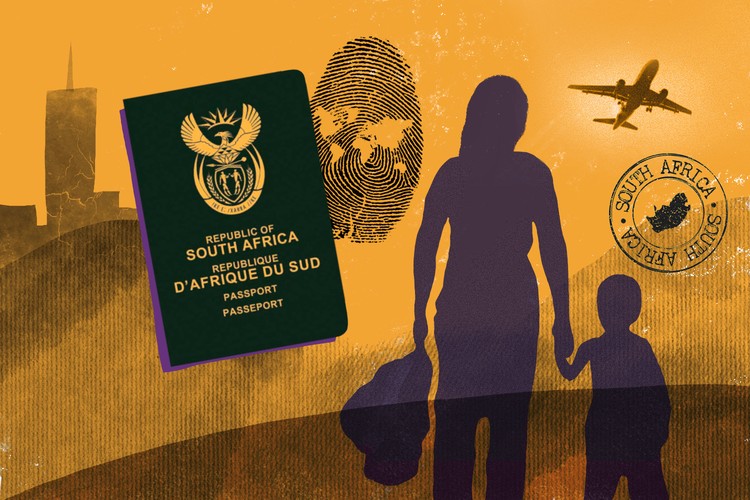South Africa could do far more for Congolese refugees
The long war in the Democratic Republic of Congo has displaced millions of people
The long war in the Democratic Republic of Congo has displaced millions of people. South Africa could do far more to help them, argues the writer. Graphic: Lisa Nelson
South Africa is better able than most African countries to offer refuge to those displaced by the long war in the Democratic Republic of Congo. So why aren’t we doing so?
The fighting in the DRC since 1996, as ethnic wars have spilled over from neighbouring Rwanda, has claimed six-million lives. Since January this year the war has escalated, as rebels supported by Rwandan forces have taken major towns in the resource-rich eastern part of the country.
The DRC itself is home to over half-a-million foreign refugees, mostly from South Sudan, the Central African Republic, Burundi, and Rwanda. Most live in camps outside urban centres, with inadequate access to food, healthcare, shelter, and education.
However, the vast majority of DRC’s refugees are not foreigners but Congolese who have been displaced internally. About 5.6-million Congolese refugees still live within the DRC. Of those, 70% come from the eastern provinces of North Kivu, South Kivu, and Ituri, where the Rwandan-backed M23 militia are most active.
A further one-million people have fled the country completely, mostly to Uganda, where more than 560,000 DRC refugees are living. Since the flare-up of fighting in 2025, however, most refugees are fleeing to Burundi. Over 65,000 people have crossed the border into Burundi since January, peaking at 9,000 in a single day. In a move welcomed by both the DRC government and the UN, Burundi has granted prima facie (assumed to be true unless proven otherwise) refugee status to DRC asylum seekers.
South Africa’s role
Of the African countries providing asylum to Congolese refugees, South Africa has more resources and a more robust system than most. Yet South Africa has taken in relatively few DRC refugees - with the total at only 45,000 by the end of 2024.
In comparison to the rest of Africa, South African refugee law is relatively liberal. The Refugee Act, in particular, allows freedom of movement within the country, freedom of association, the right to work, and access to healthcare and education.
But public sentiment towards refugees is often less welcoming. Some South Africans view immigrants as a threat, contributing to increased crime rates and burdens to state welfare. The problem is not limited to the general public: xenophobia is an issue in institutions like SAPS and the Department of Home Affairs (DHA). The Human Rights Commission has reported harassment from the police, with immigrants of all sorts, whether they are refugees or economic migrants, exposed to bribery and extortion.
Asylum seekers and refugees have reported xenophobia at the DHA. One particular area of concern is DHA’s handling of asylum seeker visas (also called “section 22 visas”). These visas allow the holder to remain in the country while their refugee status is being determined. The visa is only valid for six months, after which the applicant must re-apply. However, the number of asylum seekers processed has steeply declined over the last decades, according to the Scalabrini Institute. This has created a backlog, meaning people wait for years for a decision on their refugee status. Each time applicants are forced to reappear, they risk xenophobia from officials.
Some applicants have reported being made to have multiple (and illegal) interviews with DHA officers where money is extorted from them. Some applicants for a section 22 renewal are told to leave the country without being given a reason. Asylum seekers have been arrested at DHA offices and forcibly deported. The new Minister of Home Affairs, Leon Schreiber, takes pride in the number of foreigners deported, boasting that the Department had tripled deportations from 2023.
This makes proper integration into South African society near impossible. Finding regular employment is difficult as employers can’t be sure the applicant won’t be deported. As a result, refugees are forced into the informal labour market, where they aren’t protected by labour law. Congolese refugees have been described as being in a state of “protracted temporariness,” where they cannot be sure of their status and face deportation or imprisonment. This places a huge emotional burden on people who have already been forced to flee their homes.
The South African Constitution provides that everyone in the country, whether they are citizens or asylum seekers, has the right to basic human dignity. Additionally, the 1951 Refugee Convention, to which South Africa is a signatory, requires states to help asylum seekers navigate the asylum process. Yet, as long as xenophobia remains entrenched in the institutions intended to provide assistance, like the DHA and SAPS, vulnerable people will continue to be exploited.
Views expressed are not necessarily those of GroundUp.
Support independent journalism
Donate using Payfast

Next: Landmark judgment on evictions in Johannesburg
Previous: Court orders Gauteng health department to treat cancer patients
© 2025 GroundUp. This article is licensed under a Creative Commons Attribution-NoDerivatives 4.0 International License.
You may republish this article, so long as you credit the authors and GroundUp, and do not change the text. Please include a link back to the original article.
We put an invisible pixel in the article so that we can count traffic to republishers. All analytics tools are solely on our servers. We do not give our logs to any third party. Logs are deleted after two weeks. We do not use any IP address identifying information except to count regional traffic. We are solely interested in counting hits, not tracking users. If you republish, please do not delete the invisible pixel.

